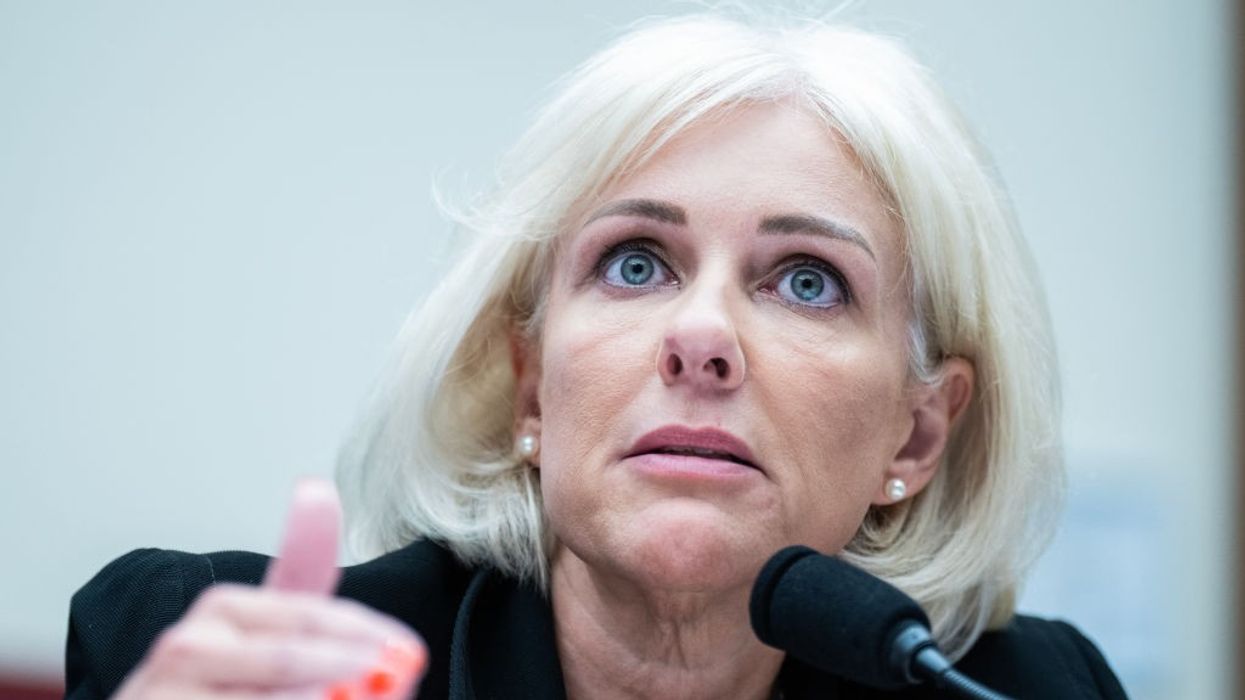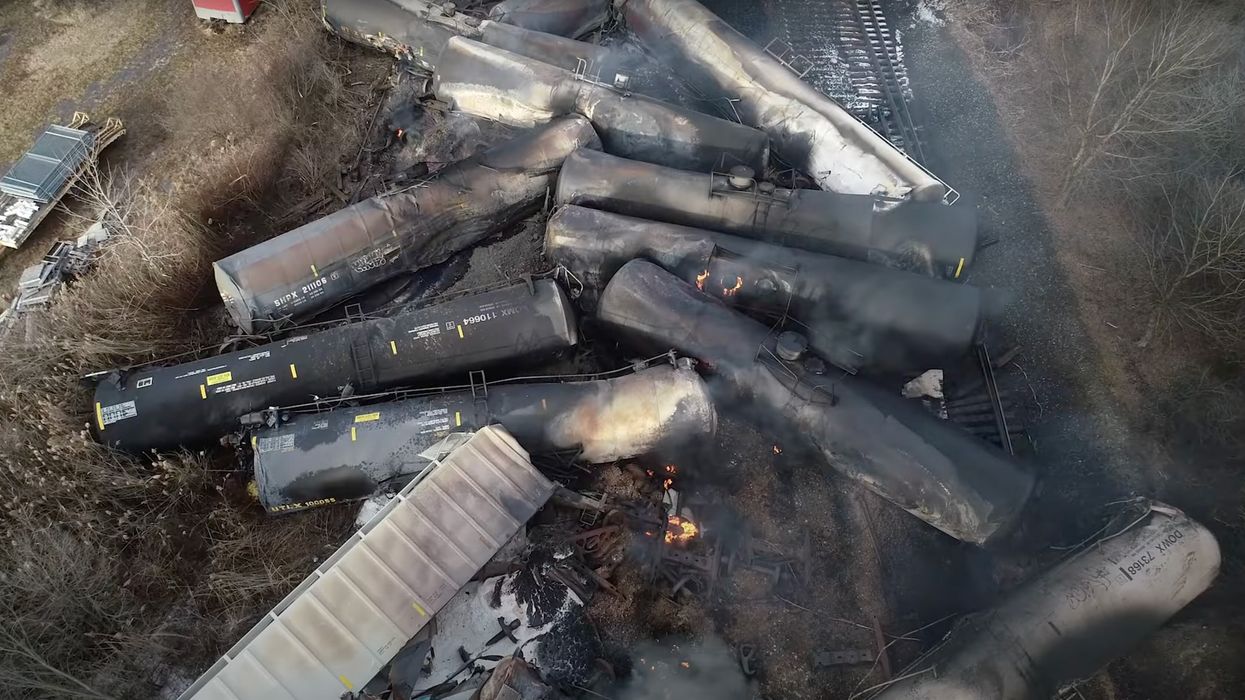'Reprehensible': NTSB Chair Says Norfolk Southern Interfered With East Palestine Probe
The NTSB chair said the company tried to "manufacture" evidence, avoided sharing information, and threatened agency staff as she released findings from a 17-month investigation into the East Palestine disaster.
The chair of the National Transportation Safety Board on Tuesday condemned Norfolk Southern for interfering with its investigation into last year's East Palestine train crash and the "vent and burn" of harmful chemicals that followed.
The remarks came at the final NTSB hearing on the disaster, in which the agency released a preliminary report—damning to Norfolk Southern and its contractors—from a 17-month investigation. NTSB officials explained that a decision to intentionally burn vinyl chloride, a carcinogen, from five derailed train cars was flawed and resulted from the company's selective sharing of information with officials at the time.
Norfolk Southern's uncooperative approach didn't stop after the vent-and-burn, according to the NTSB. Throughout the investigation, the company delayed or avoided sharing information, sought to "manufacture" evidence, and even issued a "threat" to agency staff, Jennifer Homendy, the NTSB chair, said.
"Norfolk Southern's abuse of the party process was unprecedented and reprehensible," Homendy said, also describing it as "unconscionable."
She praised NTSB investigators "for their fortitude in the face of mounting pressure, for their laser focus on the facts."
Why is this so predictable? The head of the NTSB said Norfolk Southern repeatedly tried to interfere with the agency’s investigation into the East Palestine derailment. Oh, and the venting and burning of the chemicals was unnecessary and they failed to disclose it, too.
“Norfolk… pic.twitter.com/BrKYD0Cm6s
— Truthstream Media (@truthstreamnews) June 26, 2024
Dozens of train cars derailed in East Palestine, Ohio, a village near the Pennsylvania border, on February 3, 2023. Hazardous materials were released when a DOT-111 model of train car—not ideal for carrying hazardous materials—was punctured during the crash. This set off fires that spread more than 1,000 feet and lasted for days.
On February 6, concerned that there would be a large-scale explosion, the company got official approval to breach five train cars carrying the vinyl chloride, drained it into a trench, and set it alight in a controlled burn.
That vent-and-burn was "not necessary," says the NTSB's new report, which is set to be finalized in the coming weeks. Homendy had previously said as much while testifying to a congressional committee in March, and a former Environmental Protection Agency employee also said that the incineration likely went against federal regulations, as Common Dreams reported in March.
The burning of the vinyl chloride left a chemical odor over the town, and may have been the cause of nausea, rashes, and headaches. And its impact was not limited to East Palestine—the burned chemicals spread to 16 states and likely Canada, a study released last week found.
Tuesday's hearing helped clarify why the flawed decision to burn the vinyl chloride was made: Norfolk Southern didn't share all available information with authorities, and pressured them to approve the burn immediately.
Oxy Vinyls, the company that produced the chemical, had already assessed the situation and determined that a feared chemical reaction that could have led to an explosion wasn't happening, but Norfolk Southern didn't share this with the incident commander, the report says. The East Palestine fire chief has said the company gave him only 13 minutes to approve the burn; the new report cites "unwarranted urgency."
Norfolk Southern presented vent-and-burn as the only option, the report says.
"There was another option: Let it cool down," Homendy said previously.
In fact, the temperature of one of the train cars in question was already going down, indicating that the feared chemical reaction wasn't happening, but Norfolk Southern didn't share this fact with authorities, the report says.
The company's lack of transparency began even earlier: Firefighters and emergency personnel weren't told which hazardous materials were on board until an hour after they arrived.
"This resulted in greater exposure of emergency responders and to the public to post-derailment hazards," said NTSB investigator Troy Lloyd.
When a responder called Norfolk Southern to ask for more information about the materials on board, a company representative said they would call back, but never did, The Washington Post reported.
Krissy Ferguson, a 50-year-old local resident, told the Post that she felt "heartbroken" after the hearing and called for criminal charges to be filed.
Other local people expressed similar discontent with the company after the hearing.
"Community members deserve transparency and proactive protection, not the silence, secrecy, and manipulation that has been unveiled today about Norfolk Southern," East Palestine resident Misti Allison told The Associated Press.
Homendy expressed her own discontent with Norfolk Southern's approach to dealing with her agency. She said that a senior executive had requested that the agency "put to bed" the "rumor" that the company had rushed through the vent-and-burn to keep trains moving and had said that the results of the agency's investigation could "close a chapter" for the company and allow it to "move on."
Homendy said the request was not only "unethical and inappropriate," but also that the entire room full of NTSB staff perceived it as a "threat," as "it was delivered that way."
The alleged intimidation didn't have apparent effect. In addition to its findings about the accident and the burn, the NTSB on Tuesday set forth more than two dozen recommendations for stricter safety regulations, one of which is removing the DOT-111 model of train car from flammable liquids service.
The recommendations are not binding and must be enacted by Congress, which failed to pass a proposed package of railroad reforms last year likely due to industry lobbying and Republican resistance. The Biden administration did institute new regulations in April.
Norfolk Southern issued a statement in response to the NTSB's findings.
"We resolved not to wait for the NTSB's final report before taking decisive action," said John Fleps, the company's chief safety officer. "We will continue to build on our strong safety culture through partnership and innovation to be the gold standard of safety for the rail industry."

